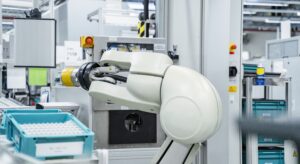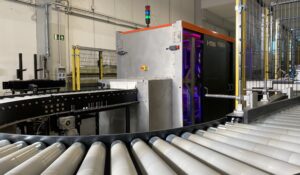Industrial automation has come a long way since its inception, transforming the way products are manufactured and processes are managed.
Thanks to industrial automation systems it is possible to replace repetitive and mechanical tasks performed by one person to achieve savings in both time and costs associated with the production process.
In this article, we will explore some of the most relevant current trends that are shaping the future of industrial automation through Artificial Intelligence, Computer Vision and Deep Learning.
Robotics and Computer Vision
Robotics, in constant evolution, has undergone significant changes in recent years, largely driven by advances in computer vision.
This has led to a revolution in industrial automation and across various sectors, redefining how robots operate and interact with their environment.
- Autonomous Decision Making: One of the highlights of robotics and computer vision is the ability of robots to make decisions autonomously. Today, thanks to advanced algorithms and visual processing systems, robots can analyse their environment, identify patterns and, with this data, make decisions in real time.
- Machine Learning: The incorporation of computer vision has taken robot learning a step further. Now, machines can learn continuously as they interact with their environment, adapting to unexpected changes and optimizing their performance over time.
- Computer vision and quality of robotic work: Computer vision has also revolutionised the quality of work performed by robots. For example, in sectors such as the food industry, robots ensure exceptional precision in product inspection, thereby elevating quality standards and reducing the possibility of errors in food production.
Artificial Intelligence, Computer Vision, and Deep Learning
Artificial intelligence (AI), computer vision and deep learning are the three key factors that are transforming industrial automation.
The advancement of machine learning (deep learning) in artificial intelligence allows machines to analyze extensive datasets, identifying patterns that might escape human perception.
On the other hand, in the field of computer vision, AI plays a key role in product inspection for quality assurance. Especially valuable in sectors like food, where precision is crucial to meet rigorous quality standards.
These technologies represent an exciting and revolutionary milestone in the evolution of automated production processes, opening up new possibilities for intelligent decision making and process optimisation in various industries.
Industrial Automation at i-mas
At i-mas, our purpose is to transform the industry with comprehensive automation solutions based on artificial intelligence. We combine industrial automation, computer vision and deep learning technologies to develop advanced and efficient systems.
We are committed to technological excellence and our strategic vision of the future.
Process automation promises not only greater efficiency, but also a safer working environment and a greater capacity for innovation.
Want to learn more about our services? Tell us about your project!



